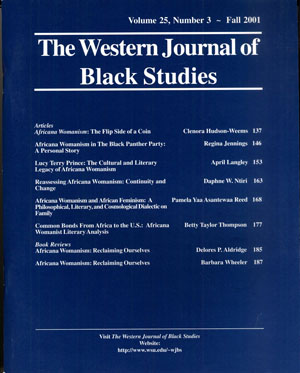Volume 25, Issue 3
Africana Womanism: The Flip Side of a Coin
Clenora Hudson-Weems
With the weight of racial pressures in the 20th century, the strained relationships among Black women emerged as well. Addressing these concerns, Africana Womanism, which is a paradigm designed for all women of African descent prioritizing race, class, and gender became an antidote to the strain currently confronting both Black women as sisters and, moreover; Black male/female relationships, the foundation of the Black family, and the key to Black survival. Africana Womanism takes its models from African women warriors and moves on to create a paradigm relative to this age-old legacy of Africana women's activism.
pp. 137–145
Africana Womanism in the Black Panther Party:
A Personal Story
Regina Jennings
This autobiographical article presents a narrative of a young woman who joined the Black Panther Party in Oakland, California, balancing the impact of the Black Panthers on the Oakland community and the sexism in the leadership of the organization. It highlights the dedication and the hard work that men and women of the Party endured in order to break the grips of racism that influenced Black people. By using the theory of Africana womanism, she argues that even though issues of race precede issues of gender, the latter concern can not be underplayed.
pp. 146–152
Lucy Terry Prince: The Cultural and Literary Legacy of Africana Womanism
April Langley
Clenora Hudson- Weems' theory of Africana womanism admits the only authentic framework within which to consider the complexity of the life of eighteenth-century griot Lucy Terry Prince, and the inextricable relationship between her personal narrative and poetic voice. Through an analysis of Terry's personal and poetic narrative, this essay resituates the poet's life and poem within the context of key characteristics as outlinedin the structure of Africana Womanism, and, in so doing, it demonstrates the value of Africana womanism as a critical paradigm for analyzing the earliest African American literature.
pp. 153–162
Reassessing Africana Africana Womanism: Continuity and Change
Dephne W. Ntiri
The author provides a review and update of the 1993 publication Africana Womanism: Reclaiming Ourselves by Clenora Hudson- Weems. The conflicts between traditional feminism and what Hudson-Weems terms Africana womanism are examined in terms of their impact upon black women and their loyalty to family, community, and social change. The author contends that race and class are the superordinate issues for the Africana woman who grapples with family and community survival and growth. Feminism, on the other hand, presently appears more compatible with the interests of white, Western women.
pp. 163–167
Africana Womanism and African Feminism: A Philosophical, Literary, and Cosmological Dialectic on Family
Pamela Yaa Asantewaa Reed
"Africana Womanism and African Feminism: A Philosophical, Liteiary, and Cosmological Dialectic on Family" examines the emerging perspectives of many of today's leading African women writers and scholars regarding the life conditions of the Africana woman and, more specifically, pertaining to African family forms. This will allow for comparisons of the divergent, global viewpoints of the Africana Womanist as espoused by Clenora Hudson-Weems, African Feminists like the legendary Nigerian activist Funmilayo Ransome-Kuti, and African scholars and writers like Filomena Chimona Steady and Molara Ogundipe-Leslie, who, amongst others, have all staked out ideological and philosophical positions on the matter of the overall condition of the Diasporan African female and the African family. At the heart of the piece is the question of relevancy and efficacy.
pp. 168–176
Common Bonds from Africa to the U.S.:Africana Womanist Literary Analysis
Betty Taylor Thompson
This article will demonstrate a distinct link between the concerns of African and African-American women writers in the characters, themes, and women's issues and concerns that appear in their fiction, dramas, and essays. The specific response of
Africana Women writers on the continent to the common concerns of Africana women are explored through the texts of Flora Nwapa of Nigeria, Mariama Ba of Sengal, and Tsitsi Dangarembga of Zimbabwe. Representing the African American women's writings are Toni Morrison's Song of Solomon and Beloved and Gloria Naylor 's Bailey's Cafe, all of which demonstrate strong Africana womanist concerns as outlined in Clenora Hudson- Weems 'Africana Womanism: Reclaiming Ourselves (1993).
pp. 177–184
Book Reviews
Africana Womanism: Reclaiming Ourselves
Authors: Clenora Hudson-Weems
Reviewed By: Delores P. Alderidge
p. 185–186
Africana Womanism: Reclaiming Ourselves
Authors: Clenora Hudson-Weems
Reviewed By: Barbara Wheeler
p. 187

| The WJBS site is normally maintained by Tanya Gonzales. Please feel free to e-mail comments, queries, and suggestions. |
Heading using the h3 tag
Lorem ipsum dolor sit amet, consectetur adipisicing elit, sed do eiusmod tempor incididunt ut labore et dolore magna aliqua. Ut enim ad minim veniam, quis nostrud exercitation ullamco laboris nisi ut aliquip ex ea commodo consequat. Duis aute irure dolor in reprehenderit in voluptate velit esse cillum dolore eu fugiat nulla pariatur. Excepteur sint occaecat cupidatat non proident, sunt in culpa qui officia deserunt mollit anim id est laborum.